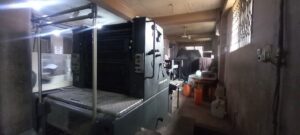Printing and publishing houses in Kumasi, Ashanti Region, are sending their work to India and China to print following the rise in prices of raw materials used for production, anecdotal evidence picked up by the B&FT has revealed.
For the past six months, prices of raw materials used for production have seen sharp increments due to exchange rate factors. All materials used in print houses are imported, hence depreciation of the cedi has had a significant impact on their prices.
Chief Executive Officer of Alpha Omega Printing House – who is also a member of the Ghana Publishers Association, Kwasi Agyekum-Hene, told the B&FT in an interview that the situation has reduced the quantum of work being done at various printing houses.
He added that the quantum of work at his firm has been cut by 70 percent since January this year, making him also reduce the number of staff from 40 to 20.

Narrating his ordeal, he said at beginning of the year glue was bought between GH₵10 and GH₵20, but now sells at GH₵150. Lamination rubber that used to sell at GH₵80 is now GH₵180. And A4 sheet which was sold at GH₵20 is now GH₵82 (a box used to be GH₵100 but is currently selling at GH₵420).
Art paper 115 which was bought at GH₵380 is now GH₵760. Art paper 130 used to sell at GH₵500 and is now GH₵850. Chip-board 250g used to be GH₵200, but it’s now GH₵420. Bond 30/40 used to sell at GH₵350 but is now GH₵470. A box of ink used to be GH₵80 and now GH₵180. FDB board used to be GH₵320 depending on the quantity, but is now GH₵470.
Apart from the excessive cost of production, Mr. Agyekum expressed worry over the numerous taxes such as ground fees, advertising fees, among others from the Ghana Revenue Authority and Kumasi Metropolitan Assembly
Mr. Agyekum explained that due to cedi-depreciation over the period, production cost has gone so high. He noted that publishers are taxed heavily when they import raw paper into the country; however, when they import finished products like exercise books from India they are exempted from some taxes such as VAT.
“We have no answers for what is happening to the publishing industry in Ashanti Region. Our business is on the verge of collapse. We do not produce any of the equipment for our work, we import virtually everything from India and China – Ink, paper, spare-parts and roller-wash (used in cleaning machines after printing).
“The papers here are very expensive; utility bills, and spare-parts for maintaining your press are very expensive here, even waste that is generated after printing is very expensive. So when all these things including operational costs are considered, you realise that printing outside is cheaper than printing in Ghana.
“Even after printing outside, the duty that you pay is much better than printing here. We all print in India and China. For common funeral brochures, the minimum is GH₵15 to GH₵20 – we used to print it for GH₵5 to GH₵8. I have covered some of my machines because I have no work to do; the machines have been there for two years. This situation is gradually killing the printing and publishing industry in Kumasi,” he lamented.










